
Richard Engel is an American journalist and author who is the chief foreign correspondent for NBC News. He was assigned to that position on April 18, 2008, after serving as the network's Middle East correspondent and Beirut bureau chief. Before joining NBC in May 2003, Engel reported on the start of the 2003 war in Iraq for ABC News as a freelance journalist in Baghdad.
Ma'arrat Misrin is a small city in northwestern Syria, administratively part of Idlib Governorate. Ma'arrat Misrin lies an elevation of 338 metres (1,109 ft). It is located 50 kilometers southwest of Aleppo and 40 kilometers north of Ma'arrat al-Numan and 12 kilometers from Sarmin. Nearby localities include Kafr Yahmul to the north, Zardana and Maarrat al-Ikhwan to the northeast, Taftanaz to the east, Ta'um, Binnish, al-Fu'ah and Kafriya to the southeast, Idlib to the south, and Hafasraja to the southwest.

Since the start of the Syrian Civil War, all sides have used social media to try to discredit their opponents by using negative terms such as 'Syrian regime' for the government, 'armed gangs/terrorists' for the rebels, 'Syrian government/US State Department propaganda', 'biased', 'US/Western/foreign involvement'. According to the Stockholm International Peace Research Institute, given the complexity of the Syrian conflict, media bias in reporting remains a key challenge, plaguing the collection of useful data and misinforming researchers and policymakers regarding the actual events taking place.
Shabiha is a colloquial and generally derogatory term for various loosely-organised Syrian militias loyal to Assad family, used particularly during the initial phase of the Syrian Civil War. As the war has evolved, many groups which had previously been considered shabiha were amalgamated into the National Defence Force and other paramilitary groups.

Al-Nusra Front, also known as Front for the Conquest of the Levant, was a Salafi jihadist organization fighting against Syrian government forces in the Syrian Civil War. Its aim was to overthrow president Bashar al-Assad and establish an Islamic state ruled by Sharia law in Syria.

The Bab al-Hawa Border Crossing is located on the Syria–Turkey border about 50 km (31 mi) west of Aleppo in northwest Syria. It connects the Syrian M45 and the Turkish D827 highways, between the cities of İskenderun and Idlib, and is known for its long lines of trucks and buses. The closest town on the Turkish side of the border is Reyhanlı in Hatay Province, and the closest towns on the Syrian side are ad-Dana and Atarib. The crossing is the site of a 6th-century triumphal arch. It has been an important crossing for Syrian rebels during the Syrian civil war.

Darat Izza is a town in northern Syria, administratively part of the Aleppo Governorate, located 30 kilometres northwest of Aleppo. Nearby localities include Deir Samaan to the north, Anadan to the east and Turmanin to the southwest.
The following is a timeline of the Syrian Civil War from September to December 2012. Information about aggregated casualty counts is found at Casualties of the Syrian Civil War.
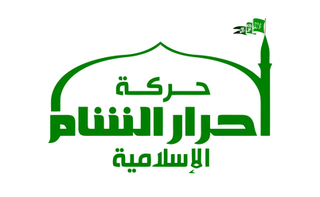
Harakat Ahrar al-Sham al-Islamiyya, commonly referred to as Ahrar al-Sham, is a coalition of multiple Islamist units that coalesced into a single brigade and later a division in order to fight against the Syrian Government led by Bashar al-Assad during the Syrian Civil War. Ahrar al-Sham was led by Hassan Aboud until his death in 2014. In July 2013, Ahrar al-Sham had 10,000 to 20,000 fighters, which at the time made it the second most powerful unit fighting against al-Assad, after the Free Syrian Army. It was the principal organization operating under the umbrella of the Syrian Islamic Front and was a major component of the Islamic Front. With an estimated 20,000 fighters in 2015, Ahrar al-Sham became the largest rebel group in Syria after the Free Syrian Army became less powerful. Ahrar al-Sham and Jaysh al-Islam are the main rebel groups supported by Turkey. On 18 February 2018, Ahrar al-Sham merged with the Nour al-Din al-Zenki Movement to form the Syrian Liberation Front.
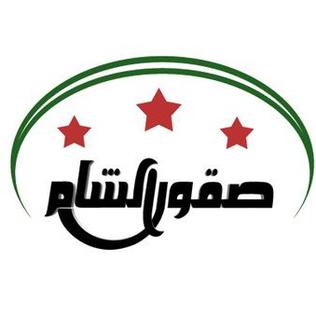
The Suqour al-Sham Brigades, also known as the Falcons of the Levant Brigades, is an armed rebel organisation formed by Ahmed Abu Issa early in the Syrian Civil War to fight against the Syrian Government. It was a member of the Islamic Front and a former unit of the Free Syrian Army and the Syrian Islamic Liberation Front. They have a history of coordinating with Ahrar al-Sham and al-Qaeda's al-Nusra Front, though clashes with the latter broke out in January 2017. In March 2015, the Suqour al-Sham Brigades merged with Ahrar ash-Sham, but left Ahrar al-Sham in September 2016. Also, in September 2016, they joined the Army of Conquest, of which Ahrar al-Sham is also a member. On 25 January 2017, Suqour al-Sham rejoined Ahrar al-Sham, but later became independent.

The Syrian Islamic Front was an Insurgent umbrella organisation alliance of various Sunni Salafi Islamist Rebel factions against the Bashar al-Assad in Syria the organisation objective is transformation of Syria into an Islamic state under Sharia law.

The battle of Raqqa, also known as the first battle of Raqqa and code named by rebels as the "Raid of the Almighty", was fought for control of the northern Syrian city of Raqqa during the Syrian civil war between Sunni Islamist rebel insurgents and the Syrian Arab Army. Rebel forces launched the offensive in early March 2013, and declared themselves in "near-total control" on 5 March, making it the first provincial capital claimed to come under rebel control in the civil war. The battle, on the opposition side, was primarily led by the al-Nusra Front and Ahrar al-Sham.
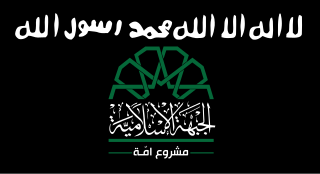
The Islamic Front was a Sunni Islamist rebel group involved in the Syrian Civil War, which was formed by the union of seven separate groups on 22 November 2013. Its three largest components were Ahrar ash-Sham, the al-Tawhid Brigade and Jaysh al-Islam. The alliance was achieved by expanding the preceding Syrian Islamic Front alliance. It was described as "an umbrella organization rather than a full union", with constituent factions continuing to serve under their own distinct leaderships.
The inter-rebel conflict during the Syrian Civil War has continued throughout the Syrian Civil War as factions of the Syrian opposition and Free Syrian Army have fought each other, with shifting alliances among various Islamist factions such as Jabhat al Nusra, Ahrar al-Sham, Jaysh al-Islam and the Islamic Front.
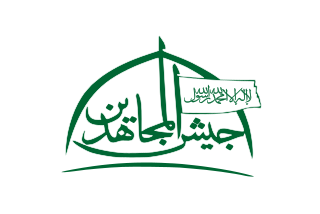
The Mujahideen Army was a Sunni Islamist rebel group formed in order to fight the Syrian government and the Islamic State of Iraq and the Levant (ISIL) during the Syrian Civil War. Originally a coalition of several Islamist rebel groups, it accused ISIL of disrupting "security and stability" in areas that had been captured from the Syrian government. During its establishment in January 2014, the spokesperson of the coalition said it would start operations in Idlib and Aleppo and gradually expand towards the rest of Syria. In December 2016, the Army of Mujahideen was briefly reorganized as Jabhat Ahl al-Sham, but this formation soon fell apart during rebel infighting in January 2017.
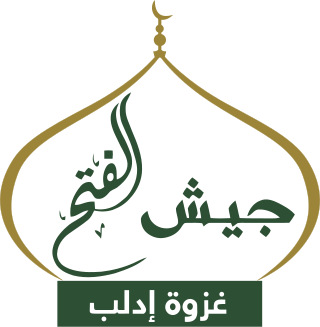
The Army of Conquest or Jaish al-Fatah, abbreviated JaF, was a joint command center of Sunni Islamist Syrian rebel factions participating in the Syrian Civil War.
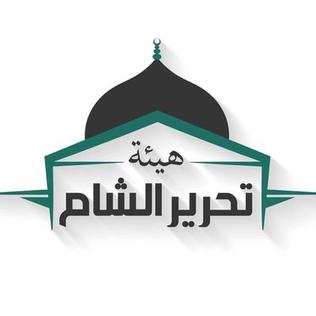
Hay'at Tahrir al-Sham, commonly referred to as Tahrir al-Sham, is a Sunni Islamist political and armed organisation involved in the Syrian Civil War. It was formed on 28 January 2017 as a merger between Jaysh al-Ahrar, Jabhat Fateh al-Sham (JFS), Ansar al-Din Front, Jaysh al-Sunna, Liwa al-Haqq, and Nour al-Din al-Zenki Movement. The unification process was held under the initiative of Abu Jaber Shaykh, an Islamist commander who had been the second Emir of Ahrar al-Sham.
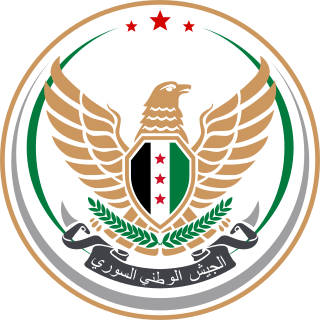
The Syrian National Army, previously the Free Syrian Army (FSA) and also known as the Turkish-backed Free Syrian Army (TFSA), is a coalition of armed Syrian opposition groups in the Syrian Civil War. Comprising various rebel factions that emerged at the onset of the war in July 2011, it was officially established in 2017 under the auspices of Turkey, which provides funding, training, and military support.
The 2015 Qatari hunters kidnapping set off a hostage crisis of nearly a year and a half in Iraq and involved negotiations and deals between many neighboring states. On Wednesday 16 December 2015, at about 3:00am local time, a party of 28 Qatari hunters, including members of the ruling royal House of Thani, were taken hostage in Muthanna Governorate, Iraq, in the desert area of Busaya not far from the border with Saudi Arabia. The Qataris remained in the hands of their kidnappers until 2017, when a deal in Syria and the payment of a ransom led to their release.
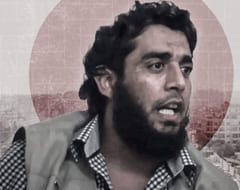
Maysar Ali Musa Abdullah al-Juburi, also known as Abu Maria al-Qahtani, was an Iraqi Islamic militant who fought in the Iraqi insurgency and then the Syrian Civil War. He was a commander and Shura Council member in Jabhat al-Nusra.

















